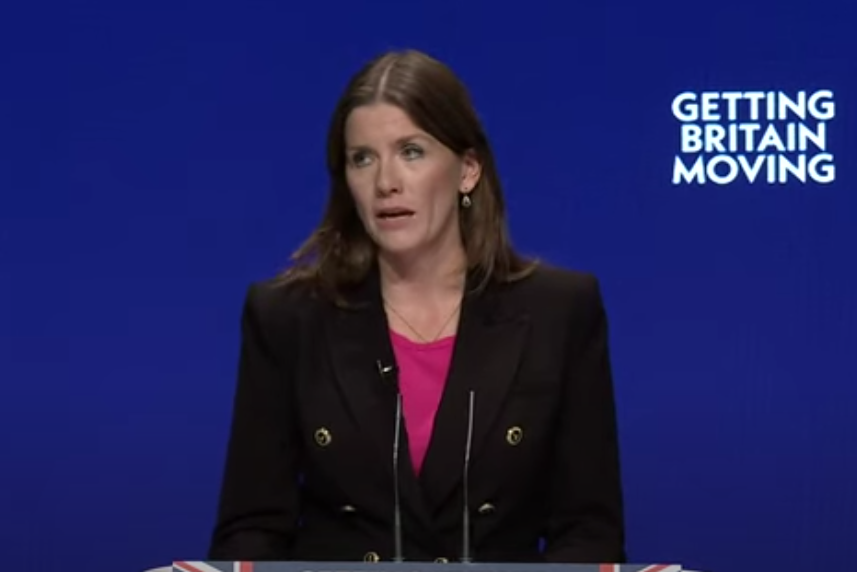
Donelan: DCMS will prioritise economic growth
In her first major speech as Culture Secretary Michelle Donelan pledges to drive growth within arts, culture and tourism sectors in order to 'create more wealth and prosperity'.
Creating more wealth and prosperity across sectors including culture, arts and tourism will be the primary aim of the Department for Digital, Culture, Media and Sport (DCMS), new Secretary of State Michelle Donelan has said.
Speaking at the Conservative Party conference in Birmingham, Donelan, who took over as Culture Secretary last month, said she wants the department to contribute to the government's plan of "growing the economic pie rather than simply slicing it into thinner pieces".
"At the heart of everything I do is making people's lives better by driving up economic growth, and that will be the department's priority," she said.
READ MORE:
- Truss appoints Donelan Culture Secretary
- Emergency budget: what it means for arts and culture sector
Donelan, the 11th person to hold the role of Culture Secretary in the last 10 years, told delegates that she has three "common sense goals" for her time at the department – "to create, connect and also protect".
"Create more highly paid tech digital and creative jobs that will provide genuine opportunities for you and your children," she said.
"This will be the beating heart of our mission to grow the economy.
"I will also work to connect communities up and down the country to better deliver broadband, 5G and phone signal. And finally, I will protect our children, our values and our history."
Wealth and prosperity
She said that her plans include "creating more wealth and prosperity through our tech, through digital, through cyber, through our cultural sector, through arts, through tourism", adding that one way of encouraging this is by replacing existing data protection requirements with less onerous rules.
This will be done by replacing General Data Protection Regulations (GDPR) with a "business and consumer friendly" British data protection system.
"[GDPR's] bureaucratic nature is still limiting the potential of our businesses. So much so that researchers at Oxford University found that businesses' profits were actually capped by eight percent because of GDPR.
"In a survey that my own department did 50% of businesses told us that the EU mainly one-size-fits-all GDPR system had led to excessive caution amongst their staff when handling data.
"We even, in fact, believe it or not, had churches writing to the department pleading to us for change so they could just send out a newsletter to their own communities without worrying about breaching data laws. This is mad.
"Many of these smaller organisations and businesseses only in fact employ a few people. They don't have the money or the resources to navigate the regulatory minefield that is GDPR and yet right now, in the main they are forced to follow this one-size-fits-all approach – the same one-size-fits-all approach that applies to multinational corportations.
She said the new system will be simpler, and clearer for businesses to navigate. Donelan also highlighted the need to support and train the workforce.
"There is also a huge opportunity for the growth agenda with the cultural, arts and creative industries and also media," she said.
"And we want to continue this trend by ensuring that we accelerate by investing in the skills we need. Another area of growth is tourism which is booming, [and] by reintroducing VAT [exemptions] for shoppers from overseas it will boom even more."
Dorries accusations
Speaking to broadcaster Andrew Marr on his LBC show shortly after delivering her conference speech, Donelan also moved to dismiss claims by former Culture Secretary Nadine Dorries that existing departmental policies had been "stopped".
In a tweet yesterday Dorries said that policies including the privatisation of Channel 4, the BBC licence fee review and the Online Safety Bill have been shelved.
"I want to assure the nation that certainly we are not putting stuff on hold," Donelan told Marr.
"I'm the type of politician that bases things on evidence. I've been in the job about three or four weeks. In terms of Channel 4 I've been very clear – I'm looking at the business case on that, I'll make an informed decision.
"On the BBC I'm a long-term sceptic of the licence fee because my Conservative values are based around choice and freedom.
"But like the rest of the nation I agree that the BBC has an integral part in our society and if we are going to save that and make sure it's sustainable in the long term we need to make sure the funding works which means that we need to get the big calls right."
She added that the Online Safety Bill will be returning to parliament with additional measures relating to protecting freedom of speech.
Join the Discussion
You must be logged in to post a comment.